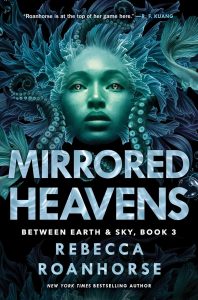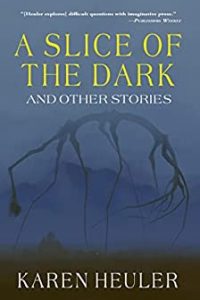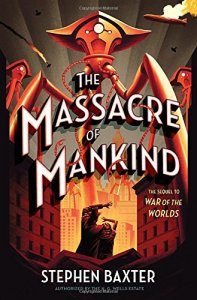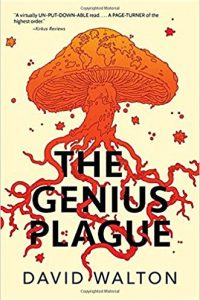Alex Brown Reviews Mirrored Heavens by Rebecca Roanhorse
 Mirrored Heavens, Rebecca Roanhorse (Saga Press 978-1-53443-770-8, $29.99. 608pp, hc) June 2024. Cover by John Picacio.
Mirrored Heavens, Rebecca Roanhorse (Saga Press 978-1-53443-770-8, $29.99. 608pp, hc) June 2024. Cover by John Picacio.
Black Sun, the first book in Rebecca Roanhorse’s epic fantasy series Between Earth and Sky, opened with one of the most impactful first chapters I’ve read in a long time. Fevered Star, the sequel, contained one of the most intense scenes of people who kinda deserved it getting slaughtered by other people it’s pretty hard to root for since the Red Wedding. Going into the final book in the trilogy, Mirrored Heavens, I expected high drama and shocking moments… and was not disappointed.
First, a quick recap. In Black Sun we met our six main characters: Serapio, a boy raised to become the Crow god reborn; Xiala, an excommunicated princess turned sea captain from an island of Amazons; Iktan, an assassin, and xir lover Naranpa, a priestess of the Sun god; Okoa, the son of a traitor trying to prove his worth; and Balam, a sorcerer who would kill everyone as long as it got him the throne. The first five characters refute the destinies designed for them to forge their own, at the expense of many lives, innocent and otherwise. The sixth shifted his schemes and continued plotting his course to the top. In Fevered Star, the gods play bigger roles, pushing their avatars Serapio and Naranpa around like pawns in an ancient and never-ending game of chess. Roanhorse guides the reader through the historical events that lead to the current chaos, and the complicated and often contradictory stories that make up what we think of as ‘‘historical fact.’’
Which brings us to Mirrored Heavens. Our six protagonists have survived this far, but they are nothing like who they were when they began this journey. Or, perhaps it is more accurate to say they have shed the identities and roles that were placed on them by others and become the truest versions of themselves. The city of Tova is trapped under an eclipsed sun and Serapio’s blood-covered fist. Xiala is back in Teek trying to free her people. Naranpa is learning the secrets of magic. Iktan is scouring the countryside searching for their lost love. Balam is getting ready to strike at the Carrion King. Okoa is plotting his revenge.
A new prophecy from the Coyote god sends Serapio spiraling. He’ll do anything to stop the prophecy from claiming Xiala, but forgets that prophecies can be as tricky as the trickster god who declared them. Tuun brings an army to Teek in an attempt to colonize the islanders. Think Columbus on Hispaniola, but demanding ships instead of gold. Tuun promised Balam a fleet of Teek ships to help him launch his invasion of Tova, and if she has to kill every last Teek to get it, she will. Gladly. Xiala’s magic is as unpredictable as the ocean herself, so she must rely on her wits and stubbornness to find a way to freedom. In the north, Naranpa learns an ancient, dangerous sorcery to try and stop the Jaguar King (aka Balam), but if she’s not careful, it could cost her her life. Iktan and Okoa are both searching for meaning in a meaningless world. Everyone they care for has seemingly abandoned them. Their quests will pull them down unexpected paths. Balam’s thirst for power is a rot that has spread to all of his allies. He would rather sit on a throne of bones in a land of desolation than let someone else rule over the living. Serapio isn’t a hero by any means, but at least he isn’t drunk on bloodlust. Eventually, everyone converges on Tova for a final showdown that had me so engrossed I stayed up until two in the morning finishing the book.
If I had to pick a thing to complain about, I’d say I found the ending to be too cozy and tidy for my liking. I had expected one last punch and got a hug instead. It makes narrative sense, and I understand why Roanhorse took the ending where she did, but I also think it was the easy way out. That said, it’s such a minor quibble that it’s hard to get even a little worked up about it. Mirrored Heavens joins with the rest of the Between Earth and Sky trilogy to make a firecracker of a series. Somehow Roanhorse managed to balance all six perspectives, giving each character a chance to add their own shading to the story. Perhaps the novel would have been shorter or the pacing faster with fewer POVs, but it also would have been less interesting and exciting. Take one of them out of the main cast, and the whole story weakens. They may not all be likable characters, but they’re all necessary. Roanhorse does a good job of not just shaping their voices but also of exploring how they shape the world.
Roanhorse has built a vast, intricate world unlike anything else out there. The trappings are familiar – young people resisting fate, gods enacting ancient feuds with human avatars, power-hungry madmen – but the execution is decidedly unique. By centering the storytelling on Indigenous ways instead of Western ways, we get a new take on an old subgenre. This is the kind of series I can’t wait to reread in a few years just so I can experience the thrill of discovery all over again. It’s visceral and electrifying. It’s everything I love about fantasy fiction.
Alex Brown is a librarian, author, historian, and Hugo-nominated and Ignyte award-winning critic who writes about speculative fiction, young adult fiction, librarianship, and Black history.
This review and more like it in the June 2024 issue of Locus.
 While you are here, please take a moment to support Locus with a one-time or recurring donation. We rely on reader donations to keep the magazine and site going, and would like to keep the site paywall free, but WE NEED YOUR FINANCIAL SUPPORT to continue quality coverage of the science fiction and fantasy field.
While you are here, please take a moment to support Locus with a one-time or recurring donation. We rely on reader donations to keep the magazine and site going, and would like to keep the site paywall free, but WE NEED YOUR FINANCIAL SUPPORT to continue quality coverage of the science fiction and fantasy field.
©Locus Magazine. Copyrighted material may not be republished without permission of LSFF.







